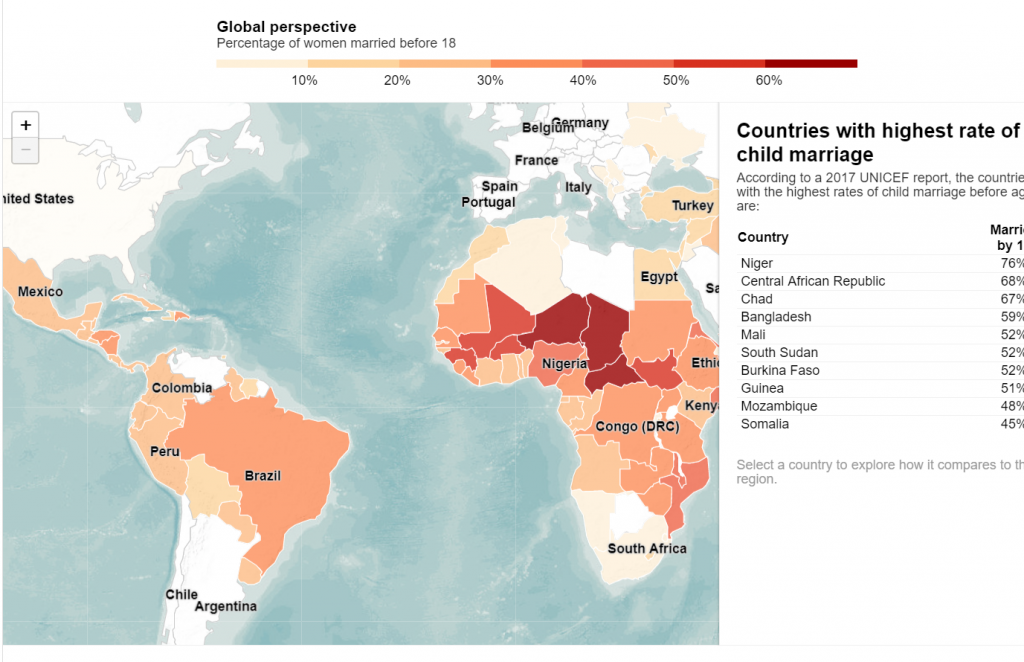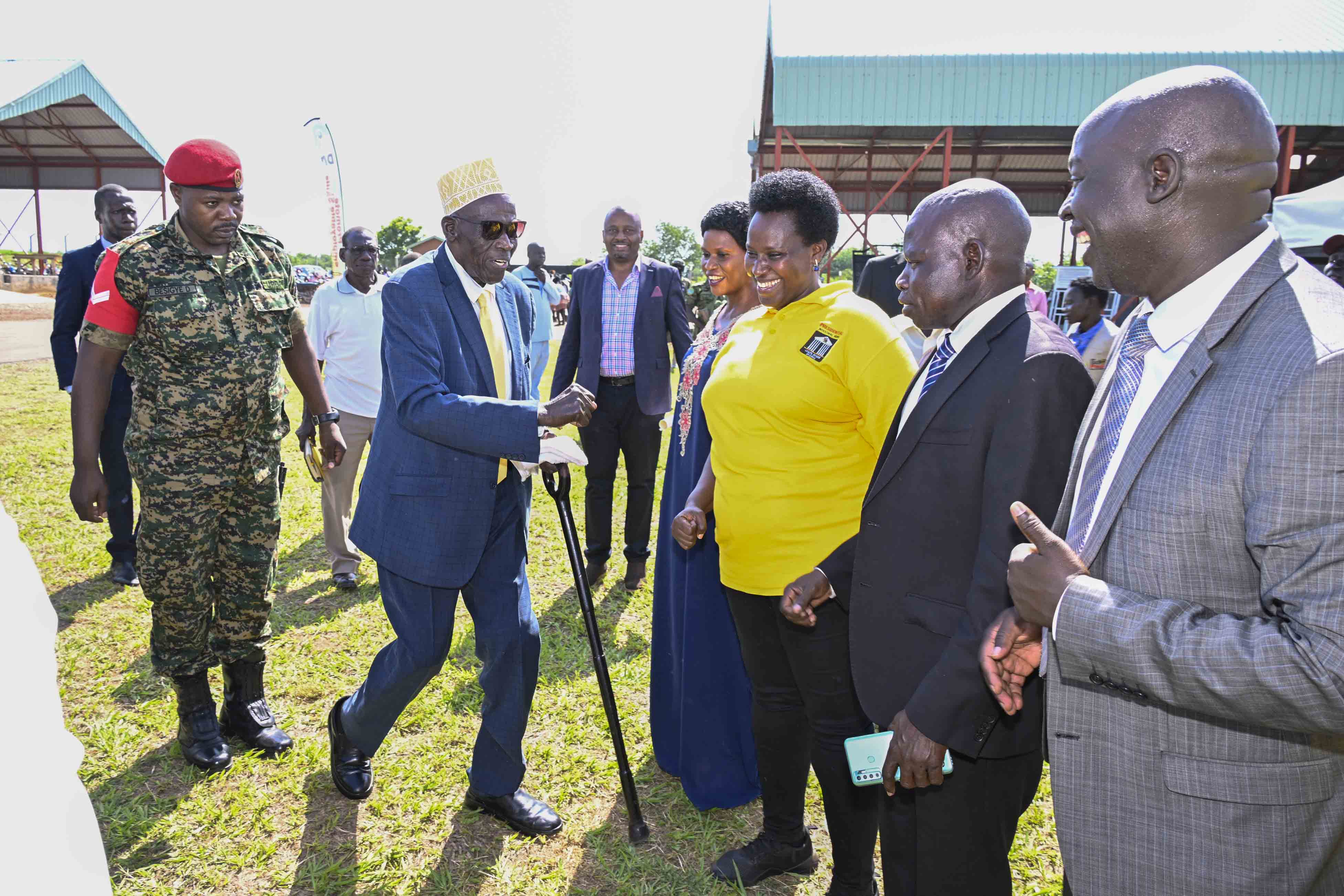THE WORTH OF A GIRL
What does a child bride bring to a marriage — a dowry, social status, domestic labor, business connections? What is her value to two families, the one she leaves and the one she joins? And what is the cost to the girl?
Somaya was 13 years old and finishing seventh grade in Herat, Afghanistan, when her father sold her for 250,000 afghani ($3,300) to marry his relative’s son.
She moved into her new husband’s family home, she says, and her father then spent much of the money on her bedding, clothes and jewellery. When Somaya asked if she could go back to classes, she says both her mother-in-law and husband beat her.
“I kept telling them that I wanted to go to school,” Somaya says. Like many Afghans, she uses only one name. “But my in-laws told me, ‘If you go to school, who will do the house chores? We bought you.’”
About 650 million children and women alive today were married before age 18, roughly 17% of the global female population, according to UNICEF. In a yearlong project, Voice of America set out to meet child brides from Albania to Pakistan to Tanzania, putting faces and voices to a practice that the United Nations is trying to eliminate by 2030.
Ending child marriage is pivotal to improving global health, eliminating poverty and expanding human rights, UNICEF says. Married teen girls are often physically abused, and their lives of chores and childbearing perpetuate centuries-old cycles of gender inequality in their communities.
The leading causes of death for girls ages 15 to 19 are complications from pregnancy and giving birth, according to the World Health Organization. Babies born to girls younger than 18 also have higher risks of death and stunting.
 The term ‘child marriage’ refers to formal marriages and informal unions in which a girl or boy under age 18 lives with a partner as if married. In an informal union, a couple lacks a formal civil or religious ceremony. Our graphic is based on United Nations information. The main sources are national census and household surveys, including the Multiple Indicator Cluster Surveys (MICS) and Demographic and Health Surveys (DHS). Surveys are subject to sampling and measurement error. We used the U.N. child marriage and population figures to approximate how many women in each country were married before 15 and before 18. Source: “Child Marriage Database”. UNICEF (March 2018)
The term ‘child marriage’ refers to formal marriages and informal unions in which a girl or boy under age 18 lives with a partner as if married. In an informal union, a couple lacks a formal civil or religious ceremony. Our graphic is based on United Nations information. The main sources are national census and household surveys, including the Multiple Indicator Cluster Surveys (MICS) and Demographic and Health Surveys (DHS). Surveys are subject to sampling and measurement error. We used the U.N. child marriage and population figures to approximate how many women in each country were married before 15 and before 18. Source: “Child Marriage Database”. UNICEF (March 2018)
Early marriage doesn’t happen in only one region or in one religion. The U.S. state of Missouri raised its minimum legal age for marriage to 16 just last year. Couples from neighboring states have long crossed into the Midwestern state to wed, often because the girl was pregnant and the baby’s father feared prison for statutory rape.
In northern Nigeria, where more than 65% of girls are married before they turn 18, according to Girls Not Brides, a London-based partnership of more than 1,000 organizations working to end child marriage, the Islamic terrorist group Boko Haram reportedly rewards its young militants with wives.
On Lombok, a lush island east of Bali in Indonesia, a girl who’s still single at 16 shames her whole family.
“People tend to think that this is an issue that affects a couple of hundred girls in small villages around the world,” says Lakshmi Sundaram, who was executive director of Girls Not Brides from 2012 until earlier this year. “It’s happening everywhere. It may look a bit different in different places, but it is a universal issue.”
The term child marriage refers to formal marriages and informal unions in which a girl or boy lives with a partner as if married before the age of 18. An informal union is one in which a couple live together over time without a formal civil or religious ceremony.
Despite the crushing consequences, more than 12 million girls a year still marry by age 18, according to UNICEF. They are often forced into a union because they may be valued by parents and others in ways that belie what is considered in the developing world a basic right to grow up, get an education and make their own choices.
The practice overwhelmingly affects girls from poor and rural areas, where child marriage is an ingrained cultural practice that some people see as protecting women with limited options.
Global worth
VOA journalists around the globe focused on the worth of a girl, looking to reveal how a young bride is valued by two families — the one she leaves behind, and the one she joins — and the cost to the girl herself of marriage before adulthood.
To solicit global views during the reporting process, VOA news teams and affiliates reporting in 12 languages posted short videos on Facebook and Instagram of girls and women talking about their experience as brides and young mothers.
These clips received millions of views and thousands of comments, from tearful emojis to arguments for and against child marriage that are steeped in faith, money, culture, power, sexism and love.
In the first of her two videos, Somaya, now 15, sits on cream-colored pillows as she calmly tells her story. Her voice breaks only when she talks about school.
“I loved to go to school every day,” she says, her green eyes tearing up. “I lost my chance to get an education.”
Among the girls and women that VOA interviewed, this theme dominated: They regret being pulled out of school and vow to help other girls, especially their daughters, avoid the same life.
In Kayapinar, Turkey, Sultan Mustafa Tumerdem, now 58, says she has had a happy life with a husband and two adult sons. Her parents forced her to marry a boy she didn’t know when she was a child, she says, and she wouldn’t wish the same for others.
“Don’t get married early, because people feel crushed when they get married early,” she says. “I didn’t go to school, and so I was crushed.”
In Honduras, Olga Emelina Vasquez Pena moved in with her boyfriend when she was 17 and pregnant. They share a home in El Granadillo and have a 15-month-old daughter. Olga says that in her village near rural La Paz, where lucrative jobs are hard to find, “few people get married.
“When you have a partner, he can help you get things,” she says.
Olga’s mother, who sits with her in the video, left school after the second grade, she says, and regrets her daughter not getting more education. Still, Olga, now 19, says she didn’t consult with anyone before her union.
“Here, kids get together with partners around 17 to 21 years old,” she says. “When you are part of a couple, you have more responsibility. You have to do things, even if you don’t want to.”
International effort
The United Nations’ efforts to end marriage before age 18 are part of a global agreement that outlines 17 so-called Sustainable Development Goals.
The SDGs include gender equality and a written target: “Eliminate all harmful practices, such as child, early and forced marriage and female genital mutilation.” It asks that governments, civil society organizations, religious and community leaders, and families work together to essentially re-evaluate the worth of their girls.
The economic case for change is powerful. By limiting girls’ education and lifetime earning potential, child marriage may be costing trillions of dollars, according to a report by the World Bank and the International Center on Research for Women, which was released in 2017. The report looked at child marriage in 25 developing countries where at least a third of women marry before age 18.
The enormous economic drain also comes from high fertility rates and poorer health outcomes for mothers and children, and from the strain on government budgets, according to the report.
“If you have high population growth, it’s very difficult to provide quality services for everybody, whether it’s for school … or whether it’s for health services or even basic infrastructure,” says Quentin Wodon, a World Bank lead economist and the report’s co-author.
Wodon emphasizes the importance of keeping a girl in school and delaying marriage.
“Investments in adolescent girls tend to have very high economic returns,” he says. That’s “not the most important reason to end child marriage — the moral argument is — but these economic returns are very useful to convince various policymakers to invest in ending the practice.”
Orkida Driza, 40, lives in Albania’s capital city, Tirana. She married at 14 and saw no other choice: Her sister needed surgery, and the woman who wanted her as a wife for her son was friendly with doctors at the hospital.
“I did it to save my sister’s life,” Orkida says.
While Orkida didn’t want her own daughter to marry before finishing her education, economic circumstances dictated otherwise. She allowed her daughter to marry at 12.
In Kalar, a city in the Kurdistan region of Iraq, Shaima Mahmood Muhammed married at 15 because she couldn’t get a job, she says, and felt she had to relieve the financial burden on her father, a Kurdish national soldier with three other children.
Experts are heartened by the example set by India, which, along with almost 200 countries, has signed on to the global pledge to end the practice.
Though India has the highest absolute number of child brides in the world, the country has almost halved the incidence of child marriage with community and legal action, and programs enabling girls to continue their studies.
The proportion of women ages 20 to 24 who were married before age 18 has dropped to 27% from 47% a decade ago, according to UNICEF.
Still, meeting the U.N. goal by 2030 would require a 12-fold increase in the current rate of change, according to UNICEF.
Education is crucial
School — so passionately discussed by the women and girls interviewed by VOA — is a linchpin. Girls who stay in school, especially through the secondary level, not only marry older, they have the chance to develop skills, knowledge and capacity to shape and control their lives, says Sundaram.
“It’s clear that there is a cyclical relationship between child marriage and education,’’ she says. The likelihood of a girl marrying before 18 fell by at least 5 percentage points for every year of secondary school she completes, according to the World Bank.
But in every nation, girls drop out of school. Parents, often lacking education themselves, find it difficult to buck generations of social norms, even if they see the value of education.
Mahi lives in a corrugated metal structure in a neighborhood of Dhaka, Bangladesh. When she was 11, her parents said she had to marry a man she’d never seen. She wanted to stay in school, she says, but her mother, sister and brother-in-law wouldn’t allow it.
“They told me, ‘We are poor people. Education will not serve any purpose, and you will not even get a good job. Just get married and maintain a family,’” she says.
Her husband left her after she helped him secure a loan to start a business, she says. Mahi has sought work in a garment factory and as a maid — to no avail.
“If I were educated and I knew how to do work, I wouldn’t have faced this situation,” she says.
[gallery size="medium" jnewsslider="true" ids="53311,53312"]
Living life
In Afghanistan, Somaya has had a different outcome. VOA returned to her in Herat five months after the first interview and found her sewing dresses alongside her mother in a sunny living room. Her father was gone, jailed for two years for abusing her and having forced her marriage.
Helped by Medica Afghanistan, a nongovernmental organization that works on women’s legal rights and offers counseling, Somaya was able to divorce her husband in February. She is learning to read the Quran with a tutor’s help and is considering becoming a tutor herself someday.
For now, “I sew clothing with my mother, and my brother works in a factory. We are the breadwinners,” she says. “My life is better.”
Reporting by Eva Mazrieva, Lina Correa, Jaffar Mjasiri, Carolyn Presutti, Muhammad Saqib, Carol Guensburg and Lisa Kassenaar.













